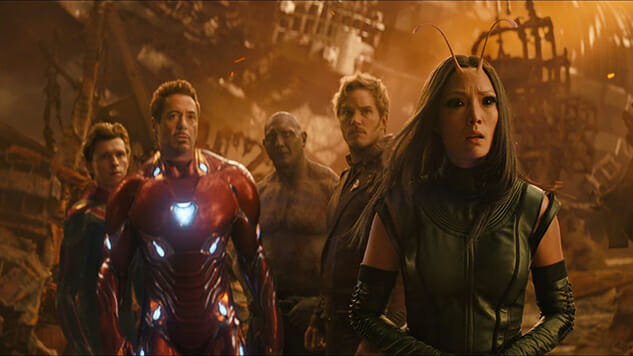The Influence of Dark Souls on Avengers: Infinity War Is Hard To Ignore

Attempts were made to keep this as spoiler free as possible. Obviously there’s Some Plot Stuff in here, so if you want a total surprise in Avengers: Infinity War, get thee to a cinema instead of reading this.
There’s gonna be a lot of hot takes on Avengers: Infinity War heading your way, and this is absolutely one of them.
It’s a big gigantic movie bridging a dozen big gigantic movies and unifying (literal) universes; most of which do not share style or tone. So the homework assignment given to the Russo Brothers is worthy of its own recognition, because making any kind of end-product with even a lick of narrative sense out of this intellectual property grab-bag is, frankly, awe-inspiring. Your personal mileage with a comic book crossover universe summer event is going to be what it is, but there was a perspective on the film that I would be remiss to not share.
Avengers: Infinity War takes all of its major cues from Dark Souls. I’m not making this up as a stretch to do some “Forget the Avengers 3 is the Dark Souls of movies” gag. It is a very direct visual, narrative, and philosophical influence on everything that happens to Cap and the gang on screen. And I hope in the weeks to come that we’ll find find the filmmakers leaning into this further.
Brief addendum before continuing: The Russo Brothers are currently adapting the game Little Nightmares into a TV show, so drawing connections between the Russos and very stylized modern gaming titles is not a huge leap.
Last chance to opt out of any spoiler territory.
Avengers: Infinity War takes place almost entirely off Earth. The universe’s best team of defenders travels the galaxy, returning to locations from previous MCU entries, only to discover that all of their work has been undone, as the evil Thanos has turned much of the universe into a graveyard. Planets and space stations exist now as testaments to the final moments of populations that are now nowhere to be found. Many of the new locations introduced in the film are eldritch tributes to planetary extinction, now presided over by ghosts, hooded floating shades or the final broken survivor. Entire cities and planets are now united by the lore of a single unholy god’s retribution. These focal points of loss are certainly one way to unify a narrative born of a dozen different storylines, but they also tip their hat so heavily in the direction of the Souls franchise, it borders on theft. Like, a really cool looking theft that I’m super into, of course. But when I look at Avengers: Infinity War I see a film so filled with style and environmental storytelling that it must have an obvious ancestor.
It’s not just locations, it’s everything about what the film has to say. This is the first Marvel title where death has a permanence that both raises the stakes, and also looms like a threat over every scene. This shared universe version of permadeath comes with the benefit of challenging each character to understand what they are willing to sacrifice, and in most cases, how they are willing to sacrifice. It is a film about impossible decisions but also about the scars that make characters ask what life itself is worth — and what could be worse than death. It’s a bleakness that, in its eclipse shadow, blots out all hope.
But there’s still a lot of cool fights. Which is probably the most videogame-y thing I could say.
Um, except for the part about the weapons. Most of the main stories in Avengers: Infinity War revolve around the creation of weapons, either forged in forgotten dark star foundries, or built from the collection of literal souls. One damned creation must be smelted by a dwarf using the direct death-burning heat of a star. If that’s not some Hidetaka Miyazaki shit, I don’t know what is.
Finally, Avengers: Infinity War is about loss. Not completely in the sense of death, but fully in the sense of failure. And whatever other comparisons I’ve made to visual and conceptual similarities between the two properties, this is truly what made me think of Dark Souls. From the opening frame of the film, there is never a moment in which the Avengers, and the audience by extension, are not on the losing side. This is not an uphill battle, this is an impossible battle. There is a scene at the midpoint of Infinity War where Doctor Strange looks into all possible futures, to see what chance the Avengers have of winning. Among thirteen million or so potential outcomes, he sees one future with a victory.
What could be more Dark Souls than that?
Brock Wilbur is a writer and comedian from Los Angeles who lives with his wife Vivian Kane and their cat, Cat. He is the co-author (with Nathan Rabin) of the forthcoming book Postal for the Boss Fight Books series.
